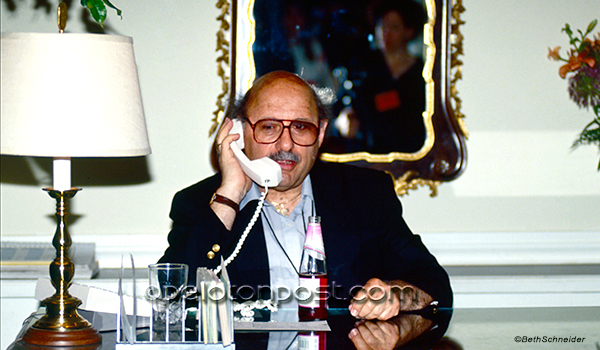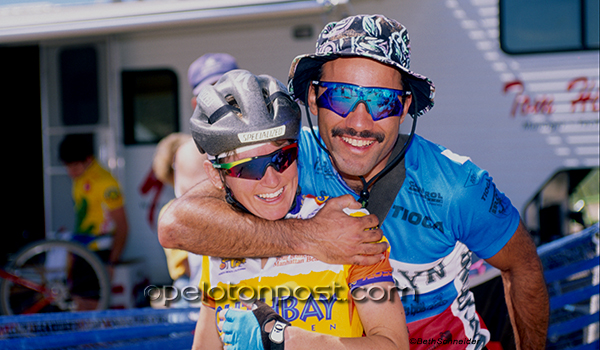Following is a copy of the tribute to Frank Litsky from the New York Times, edited:
Besides the sports mentioned, he also did some writing on cycling and his son Charlie was well known in mountain biking circles.
“Frank Litsky, 1926-2018: A Times Sportswriter of Humor and Breadth
By Neil Amdur
Nov. 1, 2018
Frank Litsky was, to borrow a line from a former colleague at The New York Times, “one of a kind.”

Not because he never learned to ride a bike, even though his son became a world-class cyclist. Or that, in busy retirement years, he still had dreams that he was late on a story and might miss a deadline.

Charlie Litsky and his wife at the 1993 Cactus Cup. Charlie died of a heart attack in 1993 at age 31. He was also incredibly well liked.
In an award-winning career that spanned 61 years, including 50 at The Times, Frank Litsky did it all, his way, with discipline and dedication, which he brought to the 44 sports he covered professionally.
Yes, 44 sports — from archery to wrestling and, year after year, the New York City Marathon, which this year is on Sunday. He even managed to write about luge, lacrosse, cricket and softball. Few other journalists, past or present, can match that breadth.
Litsky’s death on Tuesday at his home in Washington, at age 92, followed a short illness. It also capped a sad sequence: Dave Anderson, another celebrated Times sportswriter and a friend of Litsky’s, died early last month, at age 89.
Besides their proximity as longtime residents in Bergen County, N.J., Anderson and Litsky shared many common values as “good guys” — hard-working journalists, husbands, fathers and mentors. And, above all, they were true to themselves.
…Litsky’s layers of talent stretched across reporting, editing, organizing and supervising. He covered eight Olympic Games and 15 Super Bowls, but you could also find him rejoicing over close finishes at the Penn Relays or world records at a national swimming championship.
And then there was Litsky the editor — not quite obsessive compulsive, but so detailed and driven by his commitment to history, organizational accuracy and fairness that any writer would gladly attest to the notion that “In God We Trust” might have applied to him. After all, how many people amass a college football file, spread over multiple folders, of 15,000 outstanding players that dated to 1934 or an immaculate reference card file with more than 50,000 entries?
Even George Steinbrenner could hardly contest that point after Litsky once casually introduced one of his youthful assistants, Vincent Mallozzi, to Steinbrenner as a “young Yankees fan.” When Mallozzi innocently corrected, “I’m actually a Mets fan,” Steinbrenner smiled and said, “Frank is not used to making mistakes, and he probably won’t make another one as long as he lives.”
“Back then, the relationship with members of the media was far different than it is today,” Parcells said by phone on Thursday. “It was a group of guys you got to know, and the electronic media wasn’t really around, so it was more like a group meeting.”
Parcells recalled of Litsky, “I found him a genuine, warm person.”
The depth of Litsky’s knowledge was staggering, from precise statistical notes culled from years with sports such as track and field and swimming to more than 300 obituaries he wrote for The Times, many brought to life by his infinite knowledge and fraternity of friends, local and international. Litsky’s legacy will live on for readers in the coming years through the 65 advance obituaries he has left for future publication.
If you were sitting next to Litsky at a sports event, “you were always in the right place,” a former Times colleague, Malcolm Moran, recalled. He could offer hilarious off-the-cuff, inside-the-game stories, helpful style hints or even a quality post-event dining spot he had uncovered. Small wonder that over 36 years, Litsky wrote yearbooks for the Encyclopaedia Britannica, World Book and Collier’s, among others, along with a 1975 coffee-table book, “Superstars,” that became a main selection of the Sports Illustrated Book Club.
Litsky’s appreciation and respect for minor sports — at a time when most news media outlets focused their coverage on football, basketball, baseball and hockey — extended to his early embrace of women’s sports and gender equity. In 1967, he covered the Boston Marathon when a woman, Kathrine Switzer, was pulled off the course by race officials because only men were allowed to run it then. Decades later, his courtside account of the first national college basketball title by an undefeated UConn women’s team made the front page of The Times.
In 1997, Litsky became the first newspaper journalist named to the media wing of the International Swimming Hall of Fame, one of many such national honors.
Born in Waterbury, Conn., Litsky graduated from the University of Connecticut in three years at age 19. After an early career with United Press, he was initially hired by The Times as a sports copy editor, specifically in Olympic sports. But over the next 11 years, his role expanded to an assistant to the sports editor supervising the weekday sports and then as a deputy sports editor supervising the Sunday se
No matter the position, there was that sense of humor. Covering the 1991 Super Bowl during his 11 years as a Giants beat writer, Litsky observed the hordes of Lawrence Taylor and Phil Simms fans descending on the stadium and told a colleague, Bill Brink, “Here they come, the 56-11s.”
That humor attracted Zina Greene, his companion of the last 10 years after the death of his wife of 48 years, Arlene, in 2003. Litsky’s son, Charlie, who often accompanied him to sports events, died in 1993 at age 33 from a heart attack during a cycling event he was competing in.
Litsky’s extensive sports files will be donated to a library at the University of Texas in Austin dedicated to sports and culture.”




